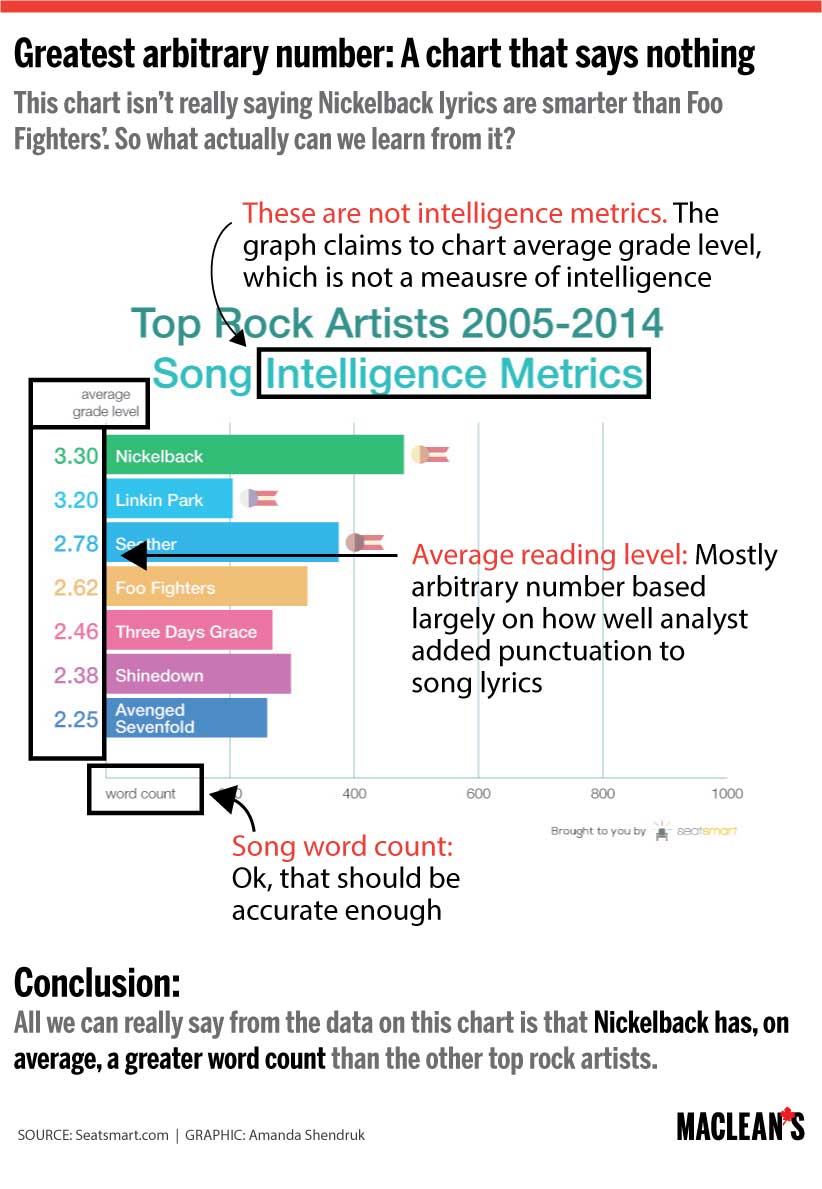No, Nickelback’s lyrics aren’t the smartest in rock music
A widely read analysis that claims to evaluate the intelligence of music lyrics is built on flawed data and logic
WEST HOLLYWOOD, CA – NOVEMBER 05: Chad Kroeger of Nickelback performs at Nickelback Special Announcement And Live Performance at House of Blues Sunset Strip on November 5, 2014 in West Hollywood, California. (Gabriel Olsen/FilmMagic/Getty Images)
Share

Let’s just skip the pleasantries and right a horrifying wrong: Nickelback does not have the most intelligent lyrics in rock music.
While most of us know this fact deep in our being, the same way we know that the sky is up and water is wet, the world’s media have recently accepted the veracity of a counterintuitive “report.” Perhaps you saw some of these jarring headlines floating around yesterday:
Nickelback has the smartest lyrics in rock music, study suggests (Huffington Post)
Nickelback more intelligent than the Foo Fighters, study says (National Post)
Lyrics for recent singles are dumb, says new report (BBC)
What is interesting about these stories is not the questionable claim of Nickelback’s lyric genius, but the fact that the articles were published at all. In brief, they report that a study of the last decade’s music has found songs are getting dumber, country is the smartest genre, and that Nickelback’s lyrics are more intelligent than Beyoncé’s.
Those claims will drive some great traffic to your site, but they simply aren’t true. And they are claims that would have stayed on the random blog from whence they came, had we all employed a bit of skepticism.
The Data Journalism Handbook proposes three questions to ask about data before hitting “publish.” Let’s answer them in relation to this “study”:
1) How was the data collected? The data’s collector, Andrew Powell-Morse at SeatSmart’s company blog, took lyrics from a decade of songs at the top of the Billboard charts. Putting them in an online calculator of readability, he determined the average level of education needed to read the lyrics of 225 songs. (The calculator also spit out word count, syllables per word, etc.)
2) What’s in the data to learn? Not much. In fact, I might even say absolutely nothing. Although Powell-Morse only recorded the average reading level of songs and artists, he refers to his findings as “lyric intelligence” and uses phrases like “smartest lyrics” to make assumptions about the intelligence of musicians, men, women, songs and genres. The main problem here is that reading level and intelligence are absolutely not the same thing. All that can be claimed from this is the level of education needed to read the words. But even that is questionable. Read on.
3) How reliable is the information? Not very. From playing around with the readability calculator myself, it’s evident that the average grade level for a song is extremely pliable. Since sentence length is a significant variable in determining reading level, I was able to vary the average readability in a Blake Shelton song between Grades 3 and 12, simply based on where I placed punctuation. As lyrics are rarely provided with commas and periods, the calculator no longer produces a reliable metric, and we are, instead, presented with an arbitrary number based simply on Powell-Morse’s punctuation preference.
In other words, “Nickelback has greatest arbitrary number, claims random blogger.”
